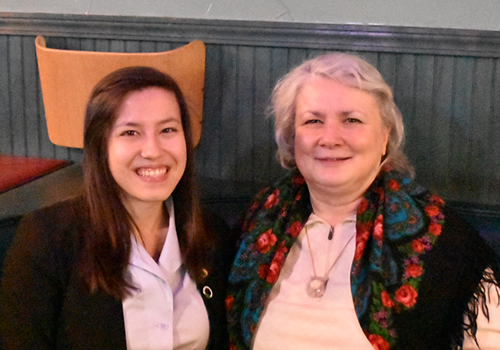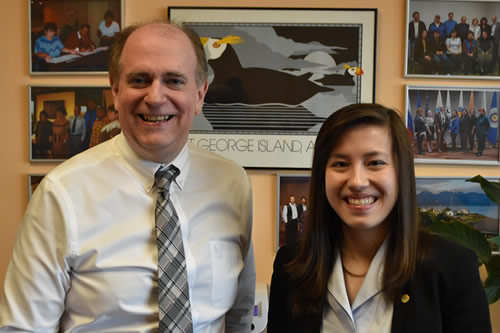University of Toronto undergraduate student Emily Tsui went to Alaska to research the mysterious decline of a once-robust Arctic organization that can trace its roots to the Cold War, but what she discovered was a field of her own.
Aided by the Dean’s Undergraduate Research Fund, the fourth-year International Relations student flew to the Alaskan city of Anchorage in February in hopes of fleshing out the sparse body of scholarly work on the Northern Forum, a group of regional governments from some of the eight “Arctic states” — Canada, the United States, Russia, Finland, Sweden, Norway, Denmark and Iceland.
Investigating Northern Forum’s collapse

Tsui wanted to determine why the forum had collapsed to its current low of nine members from its peak of 25 in 2002, and she figured the best place to start was in Anchorage, the group’s former headquarters before the state government cancelled Alaska’s membership in 2011.
“I was there to interview people and the archives were key, but there were boxes and boxes of documents that had not been opened for at least five years,” says Tsui. “I even had to break open a filing cabinet because they lost the key.”
The treasure trove of forgotten documents provided a list of key players to interview, and she soon found herself rubbing elbows with a Who’s Who of Alaskan politics and state experts, including a former lieutenant governor who could not contain his frustration about the decline of the forum, an important back door channel to keep dialogue going even while national government’s bicker over competing Arctic claims.
“I’m sorry, but I just get so emotional when I talk about this”
“He got so animated about the personal dynamics of remembering this, he took a water bottle cap and whipped it against the wall, and I’m sitting there thinking I haven’t even asked him a single question yet,” says Tsui.
“And he said‘I’m sorry, but I just get so emotional when I talk about this,’ so it was crazy to think that an organization like the Northern Forum could still create those kind of stinging emotions even five years after Alaska left.”
Tsui says she would have never had gotten access to those documents or insights if she had not been able to go to Alaska in person and build trust with the people who could share the inner secrets behind the forum’s collapse.

In the process, her work has become a sought-after resource by forum members and others keenly interested in seeing it rebound, especially as Arctic issues heat up again, as illustrated in part by the joint U.S.-Canada regional initiatives announced March 10 during Prime Minister Justin Trudeau’s state visit with President Barack Obama.
“Not only is my project contributing to the scholarly literature on Arctic governments, but it also has practical implications because it’s contributing to this forum’s institutional memory.”
Personal conflicts sparked the exodus of members
Tsui’s research uncovered personal conflicts that sparked the exodus of members from the forum. She also determined that the forum remains a practical voice for an Arctic population that — regardless of country —feels misunderstood by their neighbours to the south.
For example, one poll says 74 per cent of Canadians think there are penguins in the Arctic.
Frustration with that kind of ignorance may be fuelling a comeback for the organization. Alaska is about to rejoin the forum, now headquartered in northern Russia, and Tsui’s research helped her crystalize feelings that began when she visited the mass graves from another generation’s war during a trip to Europe.
“I want to focus my career on helping address inequality for people in the North,” says Tsui. “You really can’t appreciate the need for cooperation if you don’t understand the problems from not cooperating.”

